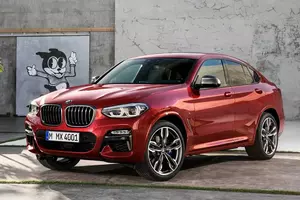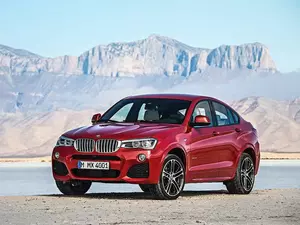
| Vehicle | Precise engine size | Difference from world average | Engine size to consumption ratio | Horsepower from 1 L | Engine size to 100 kg of weight |
|---|---|---|---|---|---|
| 30i |
2 L (1998 cc) |
14.8% smaller | 61 cc to 1 mpg | 126 hp from 1 L | 118 cc to 100 kg |
| 25d |
2 L (1995 cc) |
15% smaller | 46 cc to 1 mpg | 116 hp from 1 L | 111 cc to 100 kg |
| 20i |
2 L (1998 cc) |
14.8% smaller | 61 cc to 1 mpg | 92 hp from 1 L | 118 cc to 100 kg |
| 20d |
2 L (1995 cc) |
15% smaller | - | 95 hp from 1 L | 105 cc to 100 kg |
| M40d |
2.99 L (2993 cc) |
27.6% bigger | 81 cc to 1 mpg | 109 hp from 1 L | 158 cc to 100 kg |
| 30d |
2.99 L (2993 cc) |
27.6% bigger | 73 cc to 1 mpg | 89 hp from 1 L | 166 cc to 100 kg |
| M40i |
3 L (2998 cc) |
27.8% bigger | 130 cc to 1 mpg | 127 hp from 1 L | 150 cc to 100 kg |
| Vehicle | 30i |
|---|---|
| Precise engine size | 2 L (1998 cc) |
| Difference from world average | 14.8 smaller |
| Engine size to consumption ratio | 61 cc to 1 mpg |
| Horsepower from 1 L | 126 hp from 1 L |
| Engine size to 100 kg of weight | 118 cc to 100 kg |
| Vehicle | 25d |
| Precise engine size | 2 L (1995 cc) |
| Difference from world average | 15 smaller |
| Engine size to consumption ratio | 46 cc to 1 mpg |
| Horsepower from 1 L | 116 hp from 1 L |
| Engine size to 100 kg of weight | 111 cc to 100 kg |
| Vehicle | 20i |
| Precise engine size | 2 L (1998 cc) |
| Difference from world average | 14.8 smaller |
| Engine size to consumption ratio | 61 cc to 1 mpg |
| Horsepower from 1 L | 92 hp from 1 L |
| Engine size to 100 kg of weight | 118 cc to 100 kg |
| Vehicle | 20d |
| Precise engine size | 2 L (1995 cc) |
| Difference from world average | 15 smaller |
| Engine size to consumption ratio | - |
| Horsepower from 1 L | 95 hp from 1 L |
| Engine size to 100 kg of weight | 105 cc to 100 kg |
| Vehicle | M40d |
| Precise engine size | 2.99 L (2993 cc) |
| Difference from world average | 27.6 bigger |
| Engine size to consumption ratio | 81 cc to 1 mpg |
| Horsepower from 1 L | 109 hp from 1 L |
| Engine size to 100 kg of weight | 158 cc to 100 kg |
| Vehicle | 30d |
| Precise engine size | 2.99 L (2993 cc) |
| Difference from world average | 27.6 bigger |
| Engine size to consumption ratio | 73 cc to 1 mpg |
| Horsepower from 1 L | 89 hp from 1 L |
| Engine size to 100 kg of weight | 166 cc to 100 kg |
| Vehicle | M40i |
| Precise engine size | 3 L (2998 cc) |
| Difference from world average | 27.8 bigger |
| Engine size to consumption ratio | 130 cc to 1 mpg |
| Horsepower from 1 L | 127 hp from 1 L |
| Engine size to 100 kg of weight | 150 cc to 100 kg |

| Vehicle | Precise engine size | Difference from world average | Engine size to consumption ratio | Horsepower from 1 L | Engine size to 100 kg of weight |
|---|---|---|---|---|---|
| M40i |
2.98 L (2979 cc) |
27% bigger | 110 cc to 1 mpg | 121 hp from 1 L | 166 cc to 100 kg |
| 20d |
2 L (1995 cc) |
15% smaller | 44 cc to 1 mpg | 95 hp from 1 L | 117 cc to 100 kg |
| 20i |
2 L (1997 cc) |
14.9% smaller | 61 cc to 1 mpg | 92 hp from 1 L | 117 cc to 100 kg |
| 30d |
2.99 L (2993 cc) |
27.6% bigger | 75 cc to 1 mpg | 86 hp from 1 L | 166 cc to 100 kg |
| 35d |
2.99 L (2993 cc) |
27.6% bigger | 77 cc to 1 mpg | 105 hp from 1 L | 158 cc to 100 kg |
| 35i |
2.98 L (2979 cc) |
27% bigger | 106 cc to 1 mpg | 103 hp from 1 L | 166 cc to 100 kg |
| 28i |
2 L (1997 cc) |
14.9% smaller | 62 cc to 1 mpg | 123 hp from 1 L | 111 cc to 100 kg |
| Vehicle | M40i |
|---|---|
| Precise engine size | 2.98 L (2979 cc) |
| Difference from world average | 27 bigger |
| Engine size to consumption ratio | 110 cc to 1 mpg |
| Horsepower from 1 L | 121 hp from 1 L |
| Engine size to 100 kg of weight | 166 cc to 100 kg |
| Vehicle | 20d |
| Precise engine size | 2 L (1995 cc) |
| Difference from world average | 15 smaller |
| Engine size to consumption ratio | 44 cc to 1 mpg |
| Horsepower from 1 L | 95 hp from 1 L |
| Engine size to 100 kg of weight | 117 cc to 100 kg |
| Vehicle | 20i |
| Precise engine size | 2 L (1997 cc) |
| Difference from world average | 14.9 smaller |
| Engine size to consumption ratio | 61 cc to 1 mpg |
| Horsepower from 1 L | 92 hp from 1 L |
| Engine size to 100 kg of weight | 117 cc to 100 kg |
| Vehicle | 30d |
| Precise engine size | 2.99 L (2993 cc) |
| Difference from world average | 27.6 bigger |
| Engine size to consumption ratio | 75 cc to 1 mpg |
| Horsepower from 1 L | 86 hp from 1 L |
| Engine size to 100 kg of weight | 166 cc to 100 kg |
| Vehicle | 35d |
| Precise engine size | 2.99 L (2993 cc) |
| Difference from world average | 27.6 bigger |
| Engine size to consumption ratio | 77 cc to 1 mpg |
| Horsepower from 1 L | 105 hp from 1 L |
| Engine size to 100 kg of weight | 158 cc to 100 kg |
| Vehicle | 35i |
| Precise engine size | 2.98 L (2979 cc) |
| Difference from world average | 27 bigger |
| Engine size to consumption ratio | 106 cc to 1 mpg |
| Horsepower from 1 L | 103 hp from 1 L |
| Engine size to 100 kg of weight | 166 cc to 100 kg |
| Vehicle | 28i |
| Precise engine size | 2 L (1997 cc) |
| Difference from world average | 14.9 smaller |
| Engine size to consumption ratio | 62 cc to 1 mpg |
| Horsepower from 1 L | 123 hp from 1 L |
| Engine size to 100 kg of weight | 111 cc to 100 kg |